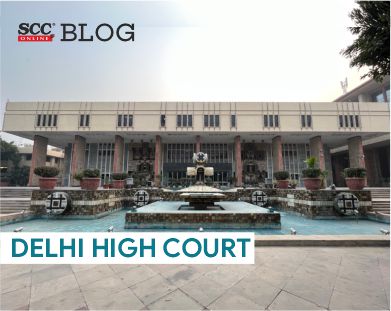Delhi High Court: While hearing an appeal filed by an engineer student against whom the Delhi Technological University had imposed Category IV punishment and cancelled all his examinations on the allegations of cheating, the Division Bench of Satish Chandra Sharma, CJ. and Subramonium Prasad, J. upheld the Order of the Single Judge, thereby dismissing the appeal and held that the persons who use unfair means to steal march over students who work hard to prove their worth should be dealt with a heavy hand and the students who get away by resorting to unfair means, cannot build this nation. Further, the Court held that the Delhi Technological University had been lenient in imposing Category IV punishment rather than rusticating the cheaters.
Background
The appellant was an engineering student at Delhi Technological University (University), and it was stated that while the examination for ‘Programming Fundamental’ was being conducted, the invigilator on duty found a mobile phone with one of the students named Himanshu during the examination, which was used for the purpose of cheating. The invigilator seized the mobile phone along with the answer sheet and informed the superintendent of the matter. On checking the mobile phone, a WhatsApp group was found, which had some portion of the question paper of ‘Basic Electrical engineering’ and some answers of ‘Programming Fundamentals’. During inquiry, it was found that the pictures of question paper and answers were shared from the mobile phone belonging to the appellant.
The appellant was asked to appear for a personal hearing before the Unfair Means Scrutiny Committee, formed by Controller of Examination, Delhi technological University. Thereafter, the University imposed Category IV punishment on the appellant. As a result of which, the University cancelled all the second semester examinations taken by the appellant and the registration of the appellant for the third semester had automatically been cancelled. The appellant was directed to register himself for second semester along with students admitted in 2022.
Submissions on behalf of the Appellant
The appellant contended that his phone was taken and misused by his roommate and his roommate only used his phone for sharing questions and answers of the said two examinations. The appellant submitted that answers to some questions were shared in the group when the appellant was still in the examination hall and therefore, he contended that the appellant was a victim of the misuse of the mobile phone by his roommate and the punishment awarded to him was grossly disproportionate to the allegations against the appellant.
Submissions on behalf of the Respondents
The respondents submitted that the appellant had shared the question paper in the WhatsApp group during the examination and shared handwritten and printout of the answers during the examination.
Analysis, Law, and Decision
The Single Judge, after going through the material on record, held that the University had undertaken a thorough probe and had examined all the material placed before it and thus, concluded that the appellant was guilty of using unfair means and the decision taken by the University did not warrant any interference.
This Court noted that the decision taken by the University was based on the reasoning that the appellant had facilitated the act of sharing and used unfair means not only limited to him alone but to other students as well which amounted to serious misconduct. Therefore, the Court held that the said reasoning does not require any interference. Further, the Court opined that “persons using unfair means to steal march over students who work hard to prove their worth should be dealt with a heavy hand. Students, who resorted to unfair means and get away with it, cannot build this nation. They should not be dealt with leniently and they should be made to learn a lesson to not to adopt unfair means in their life”.
The Court relied on Dr. Ambedkar Institute of Hotel Management, Nutrition and Catering Technology v. Vaibhav Singh Chauhan, (2009) 1 SCC 59, wherein the Supreme Court held that “the need to maintain purity and strict discipline in the conduct of examinations, was necessary for the overall progress of the nation.”.
The Court held that the University had been lenient in imposition of Category IV punishment rather than rusticating the cheaters. Thus, the Court dismissed the appeal holding that the decision of the University and the Order of the Single Judge did not require any interference by this Court.
[Yogesh Parihar v. Delhi Technological University, 2022 SCC OnLine Del 4614, decided on 13-12-2022]
Advocates who appeared in this case :
For the Appellant: Advocate Sriram P;
Advocate Vishnu Shankar M.S.;
Advocate Athira G Nair;
For the Respondent(s): Standing Counsel Avnish Ahlawat;
ASC Anuj Aggarwal;
Advocate Nitesh Kumar Singh;
Advocate Palak Rohmetra;
Advocate Laavanya Kaushik;
Advocate Aliza Alam;
Advocate Ayushi Bansal;
Advocate Sanyam Suri;
Advocate Arshya Singh.







